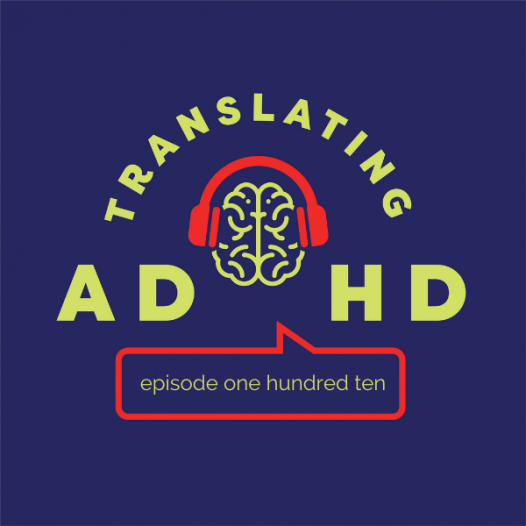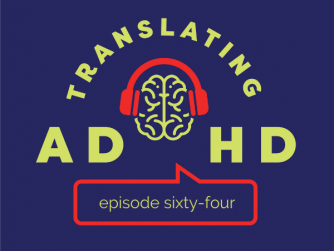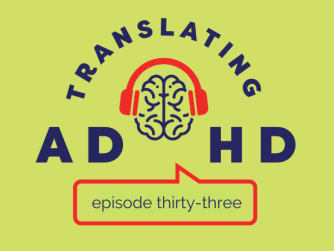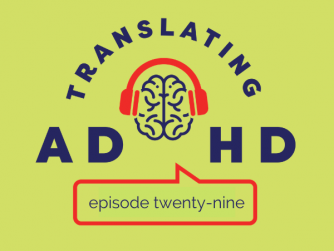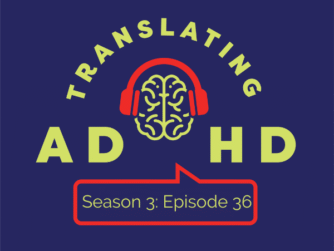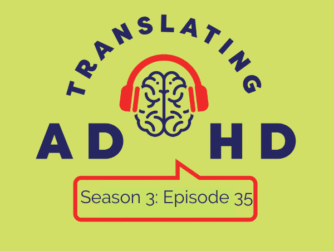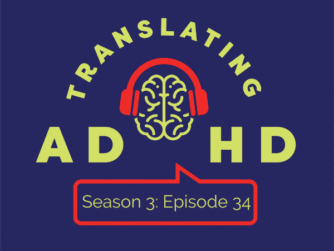This week we continue our exploration of big signal emotions as we explore rejection. Cam and Shelly discuss that with ADHD on board it’s not just rejection, but the fear of rejection that has the biggest impact.
Cam and Shelly discuss the relationship between fear and rejection and how rejection comes from a place of fear. To examine this more closely, Cam takes listeners back to a time in life when he felt rejected frequently despite the fact that he was not being rejected. Cam felt rejected at work because he was in a role where he struggled with things that his colleagues managed easily. He walks through his perceptions and emotional responses in this time period that lead to a feeling of rejection where no rejection existed. To contrast Cam’s story, Shelly introduces some examples of times in her life when she has experienced real rejection.
With ADHD on board, we often miss nuance and distinction. Using our contrasting examples of real and perceived rejection, we discuss how to distinguish between real and perceived rejection. We also discuss looking at the nuance to determine whether we are being wholly rejected and whether we want to be included in the place we are experiencing rejection.
Episode links + resources:
For more of the Translating ADHD podcast:
- Episode Transcripts: visit TranslatingADHD.com and click on the episode
- Follow us on Twitter: @TranslatingADHD
- Visit the Website: TranslatingADHD.com
Episode Transcript:
Shelly: Hi, I’m Shelly.
Cam: And I’m Cam.
Shelly: And this is translating ADHD this week. We’re going to continue our conversation on negative emotion, talking about rejection, which is a big conversation in ADHD land. Pretty much always Cam, where do you want to dig in on this topic of rejection?
Cam: There are so many places we could start Shelly. And I think back to this idea of what we try to convey here on the podcast is there’s always more to be revealed. And so I think that we’ve talked about that with emotional dysregulation, with our exploration into blame and shame.
And now today we’re going to talk about rejection and we’ll talk about RSD or rejection sensitive dysphoria. But we’ve experienced this ourselves just like we’ve experienced. Emotional dysregulation and blame and shame and other difficult emotions. And so where to begin here is come back to, I think the root of rejection is really this larger emotion of fear, right?
If you really think about what rejection is. And how it manifests. It’ll manifest as really a fear of being rejected. I was reflecting on this and the ages of Cam, you know, sort of like geologic time has its epics, you know, there’s the epics of Cam. And there was like 10 years of fear of rejection. Before that was ambivalence. The age of ambivalence. And so it felt like I was rejected all the time. That was my experience. But as I reflect on it now, looking back with curiosity and empathy for others and myself, it was a baseline fear at work. And so if we’re going to talk about rejection, we’re gonna talk about fear because most emotions are derived by either fear or love, right? Is that because there are basically two systems in the brain, the fear center or fight-flight, we get a fear-based response or this other system that is based in positive emotions.
Shelly: Kim, I think it would be helpful to talk about. What that emotion or that experience of that emotion was like for you at the time you said, I felt like I was being rejected all of the time. Can you say more about that period of life and what that experience was for you then?
Cam: Sure Shelley, you know, let’s go back to the episode where we talked about the role of trauma, right? So Andrew Huberman has the Herberman lab and he does some great, great podcasting on neurology. And he just pulls in this trifecta of trauma, fear and isolation and how they all contribute to trauma. RSD is not necessarily been associated with trauma in the literature, but you and I discussed this is that having ADHD in the world and you’re in the world and you’re being dismissed all the time because your behavior is hard to understand.
We get this. Why are you doing this? Why can’t you. Do that, right? So there’s a judgment, there’s a dismissal and there, it’s not always delivered. It’s just we’re, you know, can you please do this? And it doesn’t happen because of ADHD and our inability to articulate our experience. We don’t know. We’re not sure why we do what we do. And so then that isolation and separation, there’s something wrong with me.
This is that distinction between guilt and shame. Making mistakes, owning mistakes, versus I am the mistake. How can you own a mistake if you are the mistake? And so you have this burden, this negative weight, this sense of hopelessness. And I would also say easier access to these negative neural networks.
We still have things to do. And so what do we do is we use our fear center to get things done, right? We will use what we have available to us, and what is available to us is adrenaline, Hyper-focus to be amazing in the 11th hour. And I was amazing in the 11th hour. So I go into a new environment and everyone around me makes it look effortless.
Number one, number two, their CVS were extremely impressive. This is a teaching engagement I had added just, they were all Renaissance people. I mean, just talented. They were well-read. They were well-experienced. And so this is that school that I worked at, where the faculty and the students were impressive. And as I came in and fell flat on my face, Shelly, almost immediately. Now, the other thing was interesting was I was in a car accident and I hit my head and was knocked.
And I thought the dilemma was this, you know, some kind of trauma to the brain. And so that car accident was timed in a point where I had three performance events come together of teaching classes and showing up every day. showing up.
Doing my lesson plan. That was number one. Number two was all the grading. Number three, where these, I would say elaborate reports that were not grade based. So I had to take my grades and converted into language and oh, by the way, I have a mild reading and writing discipline. To articulate evaluate each student 80 of them on my off time. So all that, all those kinds of waves of performance come together early on in my experience. And I collapse, just, I can’t get to the other two things because I’m having to teach. So I’m asking for. extensions and thinking, oh, it must be the accident and come to realize I’d really, I kind of met my big dilemma, right?
To that point. I had scratched and clawed and found a way around getting through college, getting through high school my first year. And here I got hit with a whammy. And so then the seed of doubt enters the picture what’s going on, why I’m going to not being able to be successful here. And so it was in this period.
I got my add diagnosis, but also I’m still not being selected. And remember we are wired for context. We are wired for external inputs. We are constantly monitoring inputs from our environment. How am I measuring up? And when I see these people around me, who on paper look amazing and are amazing and make it look so effortless. Well, Think about. Emotion there. My feelings doubt starts shame starts to creep in, I am the mistake. And then that rejection was because I couldn’t do it like them or the way sometimes. I removed myself. Like I don’t belong. I don’t think I can cut this. And then you bring in emotional dysregulation and the intensity of that rejection starts to go up and off the chart where I start to question my identity, who am I? Maybe I’m not who I thought I was. And all the. An inability to explain what is going on because I felt fine. I was knocked out for a few seconds. That was a little dizzy for a couple days. And I recovered from that company.
Shelly: Thanks for that cam I uh, I just thought it was important to talk about where you were and how it felt before we talk about where you are now. So now let’s look at what you now know to be true.
About this scenario and what you’re bringing in, what has shifted for you about how you’re looking at this, how you’re experiencing it, that allowed you to see it differently.
Cam: That’s a good question. So this was a period of time. And I think that, you know, for our listeners, don’t want you to think that you have to take this long train, route here this long journey that my long journey and the pain that I had over that journey, you need not repeat that listeners.
Because this was mid-nineties where we just didn’t know a lot about ADHD. Again, even in the mid-nineties, it was this hyperactive expression that you see this disruption in a class. So I’m the inattentive, the dreamy type and the storm is not outside of me. It’s more inside rumination indecision and over. You know that was on board more than anything. This sense of overwhelm. What changed for me was when, and again, this is not about hire coach, but I did. I hired a coach after I got my diagnosis and I started medication and they all worked. They started to kind of find my way and hiring a coach, just to have someone sit with. To really map out and bring useful structure where I had no structure before. Because again, that was the big thing for me was others had this way of creating structure to manage their stuff, whether it’s time or task or blocking whatever you want to do. Prioritization for me, this confluence of these three big things together, it overwhelmed my jittery scaffolding of structure and it collapsed.
So that’s the difference. Now, the other thing was, I stayed in here. I wasn’t going to give up. That was one thing I kept showing up and there were certain facts, jelly that I couldn’t do. Certain facts that I couldn’t deny that went against this story of abject rejection or total rejection, or I don’t belong here.
I’m no good. And that was, I was a damn good teacher. I was a good teacher. And that was the evidence that came back to. From my peers, my colleagues from my students, from their parents of, Hey, you have some skillset here. And this was where this distinguishing started to help me to this sort of nuanced signal. Because when you have that big signal rejection, it wipes out all the nuanced signals, the subtle facts, right? Cause we’ll take a little gesture and we’ll look at it and then we’ll fill in the blank. Someone could be having a bad day, how I would perceive it as they’re pissed at me, they’re upset with me, but somehow it was all about me. And that’s again, that was my emotional experience. That shame. That intensity of rejection.
I couldn’t really look out beyond my own experience to think that, oh, maybe others are having their own experiences too. And it has absolutely nothing to do with me. That was a hard one to get over and you can say, well, that sounds self. And there is, there is a streak of in add land. What looks like self-centered when it actually, it’s more like rumination, no back to the top of Mount Rainier episode, 60 to 63, we’ve got that glitchy claw at the top of Rainier that will grab onto something and not let go. So we grab onto a narrative. We grab onto an emotional. And we hang on to that and that’s where we stay. Transitioning, being able to stop, pause, disrupt, look at that and consider. So what I would do is my own reflective practice of, okay, cam you’re feeling this, you’re feeling this, but let’s assume that there’s a different set of facts or there facts and my emotion, right. making it, so I can’t really get to those facts. What are those facts now? And Shelly this is just another thing to bring in is you may be in an environment where you are being rejected and that is a whole nother case, right? Because in this environment I was not being rejected. It was my perception of rejection.
And my history of dismissal and my inability to articulate my experience that made it traumatic for me and really made that response, that emotional response, much more intense.
Shelly: Yeah, I’m glad you circled back to what’s different in an environment where you are being rejected, because that was my experience all the way through school. Particularly in middle and high school. I was bullied. I was the weird kid. I was. And what that did to me is it created this maladaptive set of behaviors.
We’ve talked about the defensive crouch before that became my default place of being in any social situation. So much like you can post high school in any given situation. I was feeling the rejection or looking for the rejection or trying to defend against the rejection. When that wasn’t necessary in places where I wasn’t actually being rejected. And here’s another piece is I think so often when we talk about rejection, we don’t put ourselves in the picture. We don’t consider do I want to be accepted by this person or this group? We just feel. The rejection itself without distinguishing. Does it matter that I’ve been rejected here years ago in college? I had a really good friend. We traveled all over the country to see live music together. We were just thick as thieves.
It’s so many adventures together got into so much trouble, lot of mayhem. And one day she just quit talking to me. Just quit talking to me, wouldn’t answer my phone calls. We had plans to go to a music festival together. Couldn’t get an answer on whether or not we were still doing that. So I made separate plans, ran into her there.
She pretended like I didn’t exist. And in that period of my life that was held. Because I did I ruminate and ruminate on what did I do? What could I possibly have done? What was it? What was it about me that was so bad that all of the sudden she just cut me off years later, I ran into her at a reunion show for one of the bands that we both really loved and it turns out it didn’t have anything to do with me.
It had very, very little to do with me and a whole lot to do with her and what was going on for her at that time. And I find that to be true most of the time, most of the time when an individual is just flat out rejecting you, it’s not about you, it’s about them, but gosh, with that sensitivity to rejection, with that experience of being rejected over and over again, It is really hard to see that and it is really easy to go down.
The road of it must be me. I must deserve to be rejected.
Cam: That’s really nice. And it reminds me of, again, the maladaptive behavior that can come out of this emotion, right? The emotion that we’re feeling, as you said, it’s like you start to turn and respond to that rejection, whether it’s real or perceived and act in a certain way. For me, it was pleaser, right? And so what I would do is like, just gonna, just kind of try to be a pleaser here and be of service. And whenever anyone asked of anything, I would do it. I would drop whatever I was doing and I would do it. It was kind of pleaser and being responsive because we’re pretty good at responding. Guess what did I ever get to those reports?
That were sitting there. And my head teacher said, you know what? Take your time. Whenever you can get it to me. Did I ever get to those in that mode of pleaser? No. That chance, realizing, and this is, this is informed. The work that I do now is that most of the people that come to me, they’re great response.
They could be a pleaser, but they’re great responders. And they’re often do really well with other people’s stuff. But if it’s stuff that just matters to them, oh, this is a reference to project X Shelly. Right? The thing that only matters to us is really hard. I love. thread here on again, it’s getting to the truth and distinguishing, what is mine? What is theirs? What is ours? And I think that, again, there’s a cognitive piece here that come into that comes into play that so often is forgotten in this cognitive challenge of ADHD. And we’ve talked about like all or nothing with blank.
I think that often with ADHD, we think that our resources are infinite, even though our narrative is I’m behind, I’m exhausted, but deep in our mind, it’s sort of like, we’re always thinking, oh, in six weeks, everything’s going to clear out and I’ll have time for that. I’ll get to that. It’s really hard for us to say no, we want to say yes to things. Yes. Yeah. Count me in. Yes. Yes. Yes. And so starting to realize you have limited bandwidth, you have limited time, energy and attention. There’s that T acronym. I find it very helpful to realize, oh, if I’m giving my time away to others and.
Focused on this rejection thing. I’m not focused on doing what matters to me. And that’s what I’m realizing is that when we do things that matter to us, whether it’s going to a show or working on this podcast, personally, It helps inform what matters to us. And that’s the other thing that happens here is we’ve been talking a couple of years now about being in the picture, seeing yourself in the picture in the intense moment of rejection, that sense of self can get sideways.
Shelly: Kim. I want to go back to the all-or-nothing thinking, because I think that the way we experience rejection itself can be like that. Meaning you might reject my behavior. You might be upset or disappointed that I didn’t do what I said I was going to do, or that I have to say no to this thing that you’re asking of me.
But that doesn’t mean that you’re upset or disappointed in me as a person and with ADHD on board, we fail to see that distinction. We experience that rejection as a rejection of our whole self. When it might just be a rejection of a behavior or of a choice, a choice to set a boundary, to say,
Cam: And so that’s the interesting thing with big signal, emotional responses is it just kind of wipes the landscape of nuance and distinction. we just go with the biggest signal with the biggest narrative. It is so convincing. One last thing listeners to think about here is again, this temporal aspect here, right?
Everyone talks about time and now, and not now. And with an emotional expression. Just think about your emotional expression now. And not now we are uh, the word. I just butchered that, but I’m going to throw it out there. We can be up and down and we’re not tethered to who we are at our baseline all the time. This immediate emotional feeling you’re having is just now. And so to think about what about not now, all those other times, what is the law of averages for you? Who do you tend to be? What are your values? so as we bring this to an end, the thing that worked for me, I think, and it’s been really reinforced in the last couple years is the curiosity bringing curiosity and also bringing.
Empathy for others and empathy for self. So in that situation that you just shared with that, that example of your friend who just vanished no explanation. And Lee years later, she said well, it wasn’t about you at all. It was her own stuff. You had to have empathy for her in that moment. In order to move to a place of forgiveness, right? Empathy is a positive emotion. Curiosity is a positive emotion. As I said earlier, we are predisposed to tether, to fear-based emotions and the fear neural networks consequences. System to get things done. And when you have that big negative signal, it’s really hard to bring in subtle, positive emotions.
But as you’re listening now to bring to your reflective practice, some curiosity to look at a situation where it’s not so easy, right. A place where you’re feeling rigid. To step back and consider what the facts are. What are the circumstances? Can you have empathy for both yourself and the other or the situation, to consider that and start to distinguish. To come back to the root emotion of fear. What are you fearful of? Is it rejection or is it something else? And if it’s too much to do by yourself, you know that Shelly and I will always say, and as you said, this, I believe last week, there has to be an element of safely going and exploring this with curiosity. And if we can’t do it safely, if you can’t do it safely by yourself to do this with some professional who is trained in trauma in working with strong, strong emotion.
Shelly: Well said, Cam, and I think that’s a great place for us to wrap for today. If you like what we’re doing here on the show, three big ways you can help us out. The first is to leave a rating or review wherever you listen. The second is to not keep us a secret. Share our podcast with the people you know who are also neurodivergent.
And finally, you can become a patron for five bucks a month. You are not only helping Cam and I cover all of the costs of running this show and bringing you this content every week. You also gain access to our discord community, where our listeners are working together to do their own understand, own and translate work.
So until next week, I’m Shelly. And this was the translating ADHD podcast. Thanks for listening.

